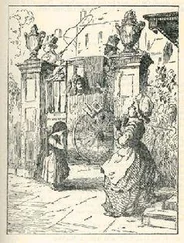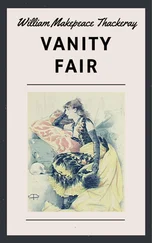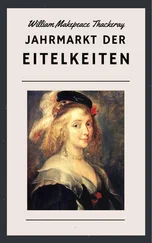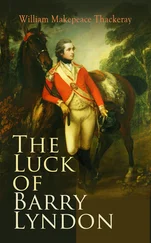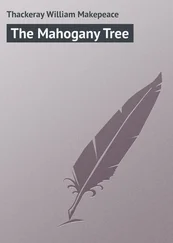William Thackeray - Barry Lyndon
Здесь есть возможность читать онлайн «William Thackeray - Barry Lyndon» — ознакомительный отрывок электронной книги совершенно бесплатно, а после прочтения отрывка купить полную версию. В некоторых случаях можно слушать аудио, скачать через торрент в формате fb2 и присутствует краткое содержание. Жанр: unrecognised, на английском языке. Описание произведения, (предисловие) а так же отзывы посетителей доступны на портале библиотеки ЛибКат.
- Название:Barry Lyndon
- Автор:
- Жанр:
- Год:неизвестен
- ISBN:нет данных
- Рейтинг книги:4 / 5. Голосов: 1
-
Избранное:Добавить в избранное
- Отзывы:
-
Ваша оценка:
- 80
- 1
- 2
- 3
- 4
- 5
Barry Lyndon: краткое содержание, описание и аннотация
Предлагаем к чтению аннотацию, описание, краткое содержание или предисловие (зависит от того, что написал сам автор книги «Barry Lyndon»). Если вы не нашли необходимую информацию о книге — напишите в комментариях, мы постараемся отыскать её.
libreka classics – These are classics of literary history, reissued and made available to a wide audience.
Immerse yourself in well-known and popular titles!
Barry Lyndon — читать онлайн ознакомительный отрывок
Ниже представлен текст книги, разбитый по страницам. Система сохранения места последней прочитанной страницы, позволяет с удобством читать онлайн бесплатно книгу «Barry Lyndon», без необходимости каждый раз заново искать на чём Вы остановились. Поставьте закладку, и сможете в любой момент перейти на страницу, на которой закончили чтение.
Интервал:
Закладка:
CHAPTER IV. IN WHICH BARRY TAKES A NEAR VIEW OF MILITARY GLORY
I never had a taste for anything but genteel company, and hate all descriptions of low life. Hence my account of the society in which I at present found myself must of necessity be short; and, indeed, the recollection of it is profoundly disagreeable to me. Pah! the reminiscences of the horrid black-hole of a place in which we soldiers were confined; of the wretched creatures with whom I was now forced to keep company; of the ploughmen, poachers, pickpockets, who had taken refuge from poverty, or the law (as, in truth, I had done myself), is enough to make me ashamed even now, and it calls the blush into my old cheeks to think I was ever forced to keep such company. I should have fallen into despair, but that, luckily, events occurred to rouse my spirits, and in some measure to console me for my misfortunes.
The first of these consolations I had was a good quarrel, which took place on the day after my entrance into the transport-ship, with a huge red-haired monster of a fellow—a chairman, who had enlisted to fly from a vixen of a wife, who, boxer as he was, had been more than a match for him. As soon as this fellow—Toole, I remember, was his name—got away from the arms of the washerwoman his lady, his natural courage and ferocity returned, and he became the tyrant of all round about him. All recruits, especially, were the object of the brute's insult and ill-treatment.
I had no money, as I said, and was sitting very disconsolately over a platter of rancid bacon and mouldy biscuit, which was served to us at mess, when it came to my turn to be helped to drink, and I was served, like the rest, with a dirty tin noggin, containing somewhat more than half a pint of rum-and-water. The beaker was so greasy and filthy that I could not help turning round to the messman and saying, 'Fellow, get me a glass!' At which all the wretches round about me burst into a roar of laughter, the very loudest among them being, of course, Mr. Toole. 'Get the gentleman a towel for his hands, and serve him a basin of turtle-soup,' roared the monster, who was sitting, or rather squatting, on the deck opposite me; and as he spoke he suddenly seized my beaker of grog and emptied it, in the midst of another burst of applause.
'If you want to vex him, ax him about his wife the washerwoman, who BATES him,' here whispered in my ear another worthy, a retired link-boy, who, disgusted with his profession, had adopted the military life.
'Is it a towel of your wife's washing, Mr. Toole?' said I. 'I'm told she wiped your face often with one.'
'Ax him why he wouldn't see her yesterday, when she came to the ship,' continued the link-boy. And so I put to him some other foolish jokes about soapsuds, henpecking, and flat-irons, which set the man into a fury, and succeeded in raising a quarrel between us. We should have fallen to at once, but a couple of grinning marines, who kept watch at the door, for fear we should repent of our bargain and have a fancy to escape, came forward and interposed between us with fixed bayonets; but the sergeant coming down the ladder, and hearing the dispute, condescended to say that we might fight it out like men with FISTES if we chose, and that the fore-deck should be free to us for that purpose. But the use of fistes, as the Englishman called them, was not then general in Ireland, and it was agreed that we should have a pair of cudgels; with one of which weapons I finished the fellow in four minutes, giving him a thump across his stupid sconce which laid him lifeless on the deck, and not receiving myself a single hurt of consequence.
This victory over the cock of the vile dunghill obtained me respect among the wretches of whom I formed part, and served to set up my spirits, which otherwise were flagging; and my position was speedily made more bearable by the arrival on board our ship of an old friend. This was no other than my second in the fatal duel which had sent me thus early out into the world, Captain Fagan. There was a young nobleman who had a company in our regiment (Gale's foot), and who, preferring the delights of the Mall and the clubs to the dangers of a rough campaign, had given Fagan the opportunity of an exchange; which, as the latter had no fortune but his sword, he was glad to make. The sergeant was putting us through our exercise on deck (the seamen and officers of the transport looking grinning on) when a boat came from the shore bringing our captain to the ship; and though I started and blushed red as he recognised me—a descendant of the Barrys—in this degrading posture, I promise you that the sight of Fagan's face was most welcome to me, for it assured me that a friend was near me. Before that I was so melancholy that I would certainly have deserted had I found the means, and had not the inevitable marines kept a watch to prevent any such escapes. Fagan gave me a wink of recognition, but offered no public token of acquaintance; it was not until two days afterwards, and when we had bidden adieu to old Ireland and were standing out to sea, that he called me into his cabin, and then, shaking hands with me cordially, gave me news, which I much wanted, of my family. 'I had news of you in Dublin,' he said. ''Faith you've begun early, like your father's son; and I think you could not do better than as you have done. But why did you not write home to your poor mother? She has sent a half-dozen letters to you at Dublin.'
I said I had asked for letters at the post-office, but there were none for Mr. Redmond. I did not like to add that I had been ashamed, after the first week, to write to my mother.
'We must write to her by the pilot,' said he, 'who will leave us in two hours; and you can tell her that you are safe, and married to Brown Bess.' I sighed when he talked about being married; on which he said with a laugh, 'I see you are thinking of a certain young lady at Brady's Town.'
'Is Miss Brady well?' said I; and indeed, could hardly utter it, for I certainly WAS thinking about her: for, though I had forgotten her in the gaieties of Dublin, I have always found adversity makes man very affectionate.
'There's only seven Miss Bradys now,' answered Fagan, in a solemn voice. 'Poor Nora'—
'Good heavens! what of her?' I thought grief had killed her.
'She took on so at your going away that she was obliged to console herself with a husband. She's now Mrs. John Quin.'
'Mrs. John Quin! Was there ANOTHER Mr. John Quin?' asked I, quite wonder-stricken.
'No; the very same one, my boy. He recovered from his wound. The ball you hit him with was not likely to hurt him. It was only made of tow. Do you think the Bradys would let you kill fifteen hundred a year out of the family?' And then Fagan further told me that, in order to get me out of the way—for the cowardly Englishman could never be brought to marry from fear of me—the plan of the duel had been arranged. 'But hit him you certainly did, Redmond, and with a fine thick plugget of tow; and the fellow was so frightened, that he was an hour in coming to. We told your mother the story afterwards, and a pretty scene she made; she despatched a half-score of letters to Dublin after you, but I suppose addressed them to you in your real name, by which you never thought to ask for them.'
'The coward!' said I (though, I confess, my mind was considerably relieved at the thoughts of not having killed him). 'And did the Bradys of Castle Brady consent to admit a poltroon like that into one of the most ancient and honourable families in the world?'
'He has paid off your uncle's mortgage,' said Fagan; 'he gives Nora a coach-and-six; he is to sell out, and Lieutenant Ulick Brady of the Militia is to purchase his company. That coward of a fellow has been the making of your uncle's family. 'Faith! the business was well done.' And then, laughing, he told me how Mick and Ulick had never let him out of their sight, although he was for deserting to England, until the marriage was completed and the happy couple off on their road to Dublin. 'Are you in want of cash, my boy?' continued the good-natured Captain. 'You may draw upon me, for I got a couple of hundred out of Master Quin for my share, and while they last you shall never want.'
Читать дальшеИнтервал:
Закладка:
Похожие книги на «Barry Lyndon»
Представляем Вашему вниманию похожие книги на «Barry Lyndon» списком для выбора. Мы отобрали схожую по названию и смыслу литературу в надежде предоставить читателям больше вариантов отыскать новые, интересные, ещё непрочитанные произведения.
Обсуждение, отзывы о книге «Barry Lyndon» и просто собственные мнения читателей. Оставьте ваши комментарии, напишите, что Вы думаете о произведении, его смысле или главных героях. Укажите что конкретно понравилось, а что нет, и почему Вы так считаете.


